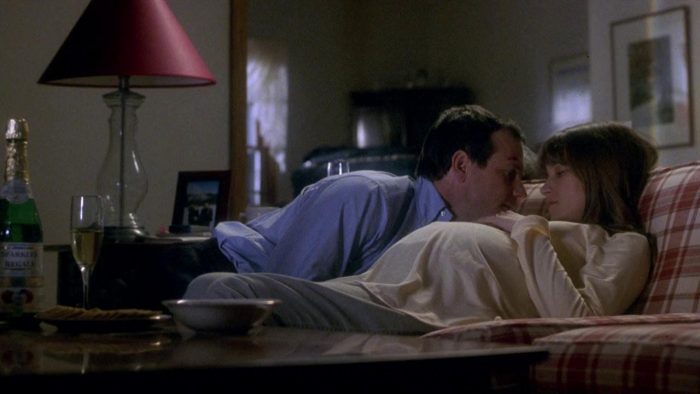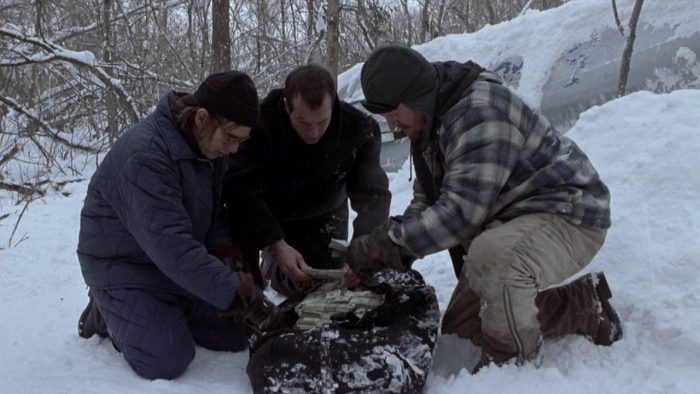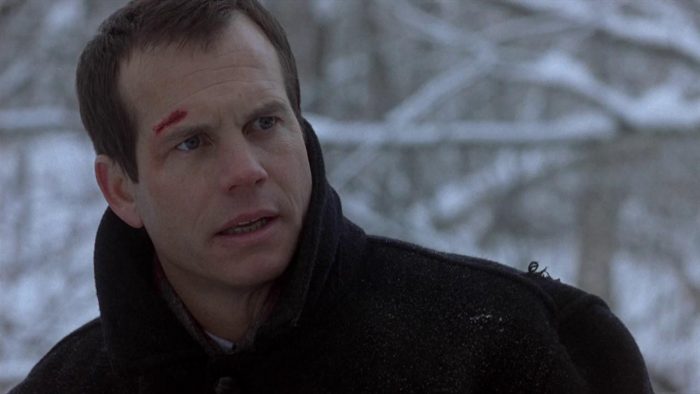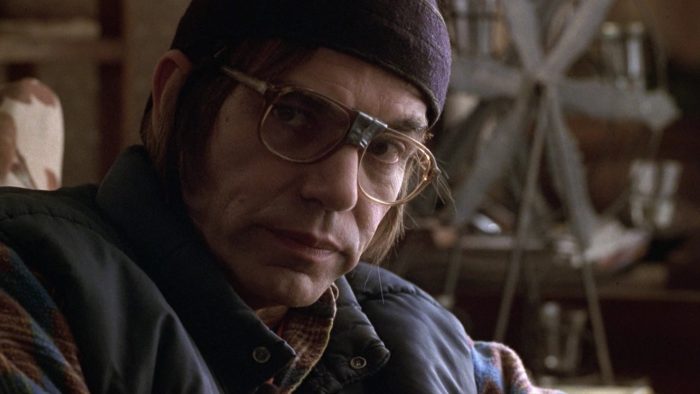'A Simple Plan' At 20: Sam Raimi's Underrated 1998 Gem Might Be His Best Film
When movie fans think of Sam Raimi, they most likely think of Evil Dead or Spider-Man. Raimi's name has become inextricably linked with these two franchises, the former of which he created and which launched his career as a feature filmmaker. As it progressed, the original Evil Dead trilogy leaned from splatter into slapstick horror. From Darkman onward, even Raimi's superhero films toggled between moments of horror and comedy. Think of the "horror hospital" scene in Spider-Man 2, where an operating room turns into a scene of shrieking terror as the sentient, serpentine arms of Doctor Octopus come to life and kill the surgical staff (including one doctor who utilizes a bone saw as a weapon in a callback to Ash Williams). It's pure Raimi: funny but scary all at the same time.
The mid-to-late 1990s marked a transitional phase in Raimi's career. As the cult director went mainstream, he ventured outside his usual genre wheelhouse and made a series of films that were less distinguishably Raimi-like than their predecessors. Sandwiched between a western and a baseball drama was a neo-noir thriller set in the snowy fields of Minnesota. More than just a foray into Coen Brothers territory, that thriller — A Simple Plan — is perhaps Raimi's most mature, meaningful film to date.
On December 11, 1998, A Simple Plan went into limited release theatrically, allowing it to qualify for the Academy Awards. Of all the titles in Raimi's filmography, this is the one that's the most straight-faced, the most grounded in some semblance of pseudo-reality. It's a character-driven, small-town crime drama that zeroes in on the human horror lying beneath the veneer of seemingly good people. What would you do if you and your friends found a bag full of money? Who would you kill to protect it?

From the very beginning, A Simple Plan frames itself as a modern tragedy, one with themes that apply directly to everyday life. The movie begins with the sight of a black crow. "Those things are always waiting on something to die," a character later tells us. Before we meet any of the characters, however, the movie indulges in more symbolism by showing us a literal fox in the hen house.
Giving a career-best performance, the late Bill Paxton brings an everyman quality to the role of Hank Mitchell. We first see Hank working in a feed mill as his monotone drawl unspools a brief opening voiceover, telling us:
"When I was still just a kid, I remember my father telling me what he thought that it took for a man to be happy. Simple things, really ... a wife he loves, a decent job, friends and neighbors who like and respect him. And for a while there, without hardly even realizing it, I had all that. I was a happy man."
Our first glimpse of Hank's wife, Sarah, played by Bridget Fonda, comes through the gaps of a bookshelf in the local library, where she works. At home in the bathroom, her bared belly shows round and pregnant. Theirs is a modest, middle-class life, which seems the picture of domestic bliss. Yet we know from Hank's voiceover that this is not to last.
Paxton would bring the same blue-collar pathos to his role in Frailty, another great Gothic film about a father who thinks that demons are masquerading as humans and he's been divinely chosen to ax them. While A Simple Plan lacks the religious overtones of that movie, it's a film that would fit right in with a book club discussion about the universality of corruption and original sin. Early on, Hank even receives a subtle mark of Cain on his forehead when a crow attacks him in the woods.
It's there that Hank, his brother, Jacob (Billy Bob Thornton in an Oscar-nominated role), and Jacob's uncouth pal, Lou, find a downed plane with 4.4 million dollars in it. "It's the American dream in a goddamn gym bag!" Lou proclaims.
 "You work for the American dream," Hank counters. "You don't steal it."
"You work for the American dream," Hank counters. "You don't steal it."
The money could be stolen, in which case, it should be returned to its rightful owners. Or it could be drug money, in which case, someone dangerous might come looking for it. Keep in mind, this kind of scenario usually doesn't turn out well for Coen Brothers characters ... but of course, A Simple Plan pre-dates No Country for Old Men by nine years. Maybe Raimi was inspired by the success his former collaborators had with their 1996 Best Picture nominee, Fargo (Raimi and the Coens co-wrote The Hudsucker Proxy together and Raimi served as the film's second-unit director). Whatever the case, as fans of the Fargo TV series know, it wouldn't be the last time Billy Bob Thornton popped up in Minnesota.
At first, Hank tries to do the right thing. As Lou makes his case for keeping the money, which Jacob likens to a "lost treasure," Hank comes up with a suggestion that seems inspired by the angels of his better nature. "Hey, what if there's a reward?" Maybe they can turn the money in and there will be a reward that allows them to wash their hands of any risk while still benefitting. It might seem like a feeble alternative in the face of a four-million-dollar shortcut to prosperity, but it's a reminder that the universe does offer an "out" sometimes when a potentially regrettable course of action seems irresistible.
As Lou continues to argue on behalf of what looks like a sure thing, Hank starts to come around to the idea of keeping the money. He deliberates silently, his eyes lighting up as if tempted by something deeply unfathomable. Before he speaks and seals the Edenic transgression that will precipitate the downfall of numerous people in his orbit, the crow caws.
Prior to this, we've seen that there was bad blood between Hank and Lou. But now they're in cahoots together as Hank hatches the titular "simple plan" aloud. The three men agree to let Hank stash the money away until the snow clears and they know no one's looking for it. At that point, they'll split the money up and leave town, going their separate ways.
Hank makes Lou promise not to tell his wife, but it's a promise he himself can't even keep because when he gets home, he immediately shows the money to Sarah. It's the first in a series of questionable decisions and uncontrollable factors that complicate his plan. Chief among Hank's problems, initially, is Lou, who shows up on his front doorstep one night, wanting his cut of the money.
Character actor Brent Briscoe, who also passed away last year a few months after Paxton, plays Lou. With his mercurial drunkenness, Lou is an unwieldy force of life that Hank struggles to keep in check. He's Jacob's best friend, so it's not always clear if Jacob is going to be more loyal to him or Hank, and he cycles through emotions so quickly that there's no telling what he'll say or do next.
Hank doesn't have experience as a criminal and accordingly, he makes some stupid mistakes. When Sarah convinces him to return part of the cash to the plane to make it look like no one was there, he takes his glove off while he's handling the bundles of hundred-dollar bills. He leaves fingerprints on the money ... and that never even comes back into play, plot-wise. It just shows that Hank isn't as smart as he thinks he is.
Sarah is more matter-of-fact about the money. When she discovers that it's ransom money through a newspaper article, she states, "Hank, it's always been stealing. We just didn't know who we were stealing from." As greed and distrust mount among the men, Sarah conceives her own plans, like the one to secretly tape Lou's play-acted confession. This leads to a pressure-cooker scene at Lou's house, which builds to a nightmare of cartoon violence, just in case you forgot you were watching a Raimi film.
Throughout the movie, Sarah wields a Lady-Macbeth-like influence. The scene where she deconstructs her and Hank's previously happy, humble life — with its little indignities of clipping coupons and skipping the appetizer at restaurants — is heartbreaking. As she pleads with him not to relinquish their ill-gotten gains, her voice cracks with desperation and you can see the goodness crumbling, see the pride and contempt that was perhaps always milling below the surface. The money has a similar effect on Hank's other co-conspirators, warping their intentions or perhaps just laying bare their true corrupt nature as human beings.
Fonda has since retired from acting, but this is one of her best roles and it saw her working on the same movie as the man who would become her real-life husband, composer Danny Elfman. Abandoning the brass of his Batman film score for woodwind and strings, including flutes, violin, and banjo, Elfman's score for A Simple Plan marked an interesting stylistic departure for him. Like Raimi, he was going through an experimental phase at the time, and if you didn't know he was the composer, you could be forgiven for thinking it was Thomas Newman or even Ennio Morricone.
Divorced of special effects, the evil we see unfold in A Simple Plan is all the more insidious and chilling because of how mundane and believable it is. That old quote, "Money is the root of all evil," which is actually a Biblical quote, is really just another way of saying that greed of some form or another drives most of the world's problems. Even the Ten Commandments mostly boil down to admonishments against stealing, whether it be stealing honor or someone else's life, spouse, or property.
A Simple Plan understands that; it understands the insatiable aspect of human nature and how that can lead to misery. It also understands the pettiness that can permeate group dynamics: all the infighting and manipulation that occurs when people play against each other in relationship triangles.
Hank is supposed to be the straight-laced one, but he winds up being the fox in the henhouse, an unrelenting schemer who exploits his brother to the degree where he'll even shift psychological tactics, appealing to Jacob's base self-interest when needed. With his glasses taped together and a knitted cap over his head, Thornton disappears into the role of Jacob, affecting a dopey grin and occasional stutter. Devoid of vanity, Jacob is perhaps the most pure-hearted character in the movie, which makes it all the more tragic when we see him come undone.
Twenty years later, A Simple Plan still simmers with tension, yet it's also mournful and understated in ways you might not normally associate with Raimi as a director. This is a movie that simultaneously stretched Raimi's filmmaking boundaries and provided him with a new set of formal constraints, thereby leading to some of his very best work.
Aesthetically, thematically, even sociologically, A Simple Plan carries a downright literary weight. This might stem partially from Raimi handing over the writing reins to author Scott B. Smith, letting him adapt his own novel into an Oscar-nominated screenplay. It might also stem from him consciously deciding to rely less on camera trickery and more on the performances of his actors. Whatever the case, it sounds like a back-handed compliment, but this is a motion picture that has more to say about the human condition than any other Raimi film.
